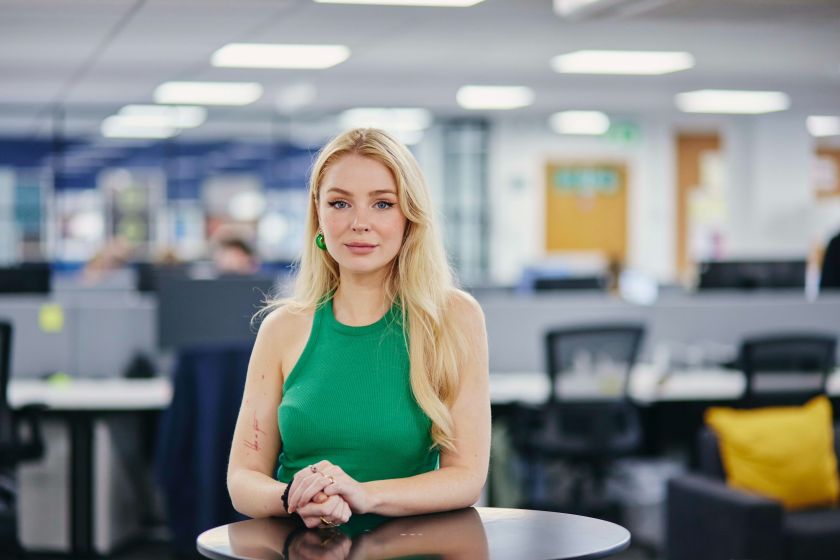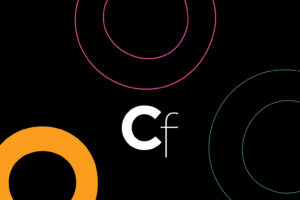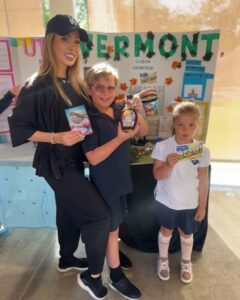Sarah O’Connell on proving people wrong and why the creative industry needs more working-class voices


In this edition, part of our Visibility & Representation theme, we speak with Sarah O’Connell, head of copy at Mr B & Friends, about classism, confidence, and why creativity thrives when we embrace difference.
Sarah O’Connell didn’t follow a typical industry pathway. She didn’t attend elite schools or even know copywriting was a job until her twenties, but she has carved out a career that proves the power of craft, confidence, and community.
Now Head of Copy at Bristol-based branding agency Mr B & Friends, Sarah is vocal about the underrepresentation of working-class creatives and the danger of sameness in an industry that claims to value originality. In our latest In Her Own Words Q&A, she reflects on self-belief, self-promotion, and why progress in the creative industry means more than just talking the talk.

Have you ever felt unseen or underestimated in your career, and how did you overcome it?
Oh yeah. I’ve had people mock me for my accent, my background, and my work history – I didn’t attend great schools or have a traditional industry-pathway education. I didn’t even know this career existed until I was in my twenties! So, I came in a bit late, without the same depth of industry knowledge as others, and I was constantly underestimated.
The sharpest shutdown is proving people wrong. I’ve kept learning, honing my craft – constantly bettering myself. You make yourself undeniable. I know I’m good at what I do. And that’s the key, I think – you have to really believe in your own craft.
I know people say this all the time, but hold on to your accomplishments. This isn’t just for juniors or those just starting out; it’s for everyone. Keep a folder on your desktop. Stuff it with nice work and nice words. Use it to remind yourself of your hard work and your mark on the world.

How do you approach self-promotion and making your work visible?
When I learnt to drive, I was always anxious about what other drivers might be thinking if they had to slow down or make space for me. My instructor would repeatedly say, “It’s your road, too.” And for some reason, that phrase really stuck with me.
It’s noisy out there, and our industry has a peculiar habit of revering certain individuals or placing them on a pedestal. So, self-promotion can feel intimidating, especially if you’re sharing content that aligns with their interests. But it’s your road, too. Focus on your own journey.
Stay authentic. You don’t have to be loud or brash if that’s not you. And you don’t have to be meek and humble, either. But you do have to believe your thoughts and ideas matter. Your experiences, your opinions, your perspective – nobody else has lived your life.
So keep sharing your point of view, keep speaking up, keep doing great work – that part speaks for itself. Surround yourself with people whose opinions you actually care about, and ask them for feedback.

What role has mentorship or community played in your career growth?
I’m so lucky to have a hugely supportive female(!!) ECD – something we all know is way too rare in this industry. She’s a great mentor, and she’s helped me become a better advocate for my own ideas and opinions, especially when I’m surrounded by industry veterans. Having someone so senior in your corner who treats you as an equal and encourages you to speak up is invaluable.
In my experience, mentorship doesn’t just have to come from the most senior people in the room. I’m constantly educated, inspired, pushed, challenged, and supported by my wider team at Mr B. This might not follow the traditional mentor/mentee relationship. But these are the people who stretch me and encourage me to grow.
What’s one change you’d like to see in terms of representation in the creative industry?
I’ve always been drawn to other self-described oddballs – people from traditionally underrepresented, overlooked, and undervalued groups who aren’t part of the typical homogeneous makeup of our industry. They typically end up being the people doing something truly interesting or different, making powerful, emotive, distinctive work.
I bang the drum a lot about Class representation. It’s estimated that only 16% of people in full-time creative roles are from a working-class background, with women especially underrepresented. Men from privileged backgrounds are 4.8 times more likely to secure work in creative occupations than working-class women.
How can we claim to be making work for the masses when we aren’t representing them? How can we meaningfully connect with those whose lived experience we don’t understand?
Not to mention, sameness makes us predictable. Do we really have much to offer if everyone shares the same perspective, the same experiences, the same old stories?
While AI drives the amalgamation of average, true creativity demands difference. Surrounding ourselves with a mix of intelligent, curious, funny, fascinating, diverse people makes our own work braver and bolder.
It’s time we stop preaching progress and start practising it.






